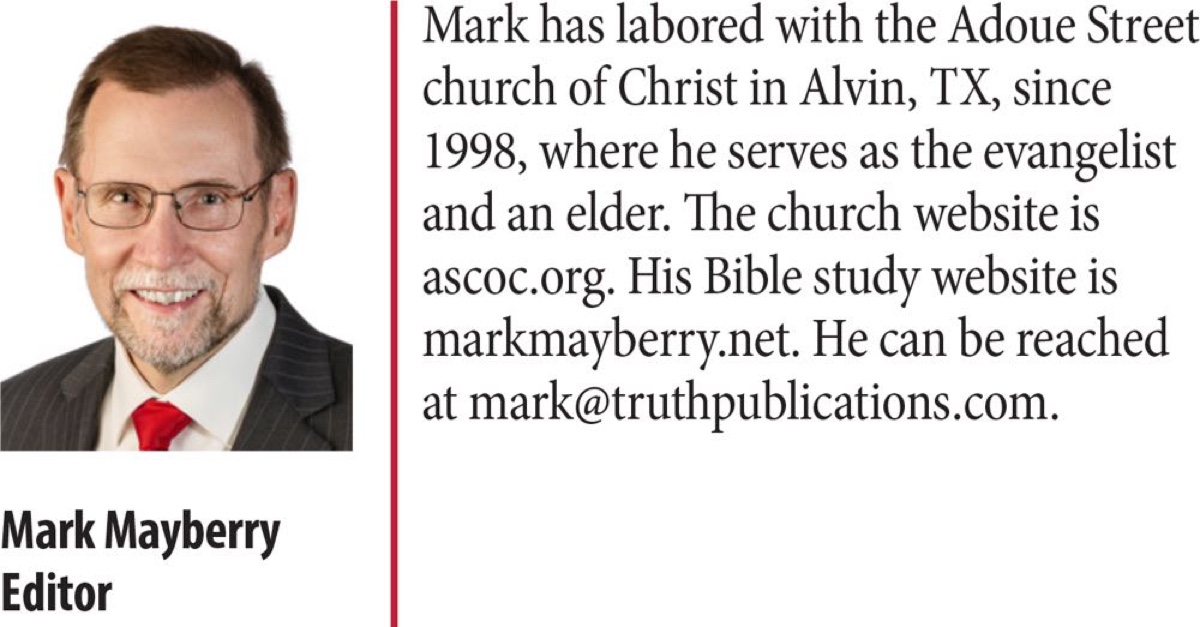By Mark Mayberry
Synopsis: Similarities between contemporary culture and the period of the Judges serve as both a warning and an encouragement. We can fall into the same trap as did apostate Israel, or prevail over our adversaries, as did Deborah and Barak.
The story of how God used Deborah and Barak to deliver Israel from Canaanite oppression is a highlight of the book of Judges—an otherwise dark and depraved period when “every man did what was right in his own eyes” (Judg. 17:6; 21:25). The subsequent Song of Deborah and Barak, recorded in Judges 5, contains several striking statements that capture the reason Israel enjoyed success:
That the leaders led in Israel, that the people volunteered, bless the LORD (Judg. 5:2)!
My heart goes out to the commanders of Israel, the volunteers among the people; bless the LORD (Judg. 5:9)!
At the sound of those who divide flocks among the watering places, there they shall recount the righteous deeds of the LORD, the righteous deeds for His peasantry in Israel. Then the people of the LORD went down to the gates (Judg. 5:11).
We must recognize God’s position and power. He is exalted. He is our King and Commander. Wisdom and guidance originate with Him. As an expression of His righteous character, God bestows blessings or brings disaster based upon man’s obedience or rebellion. His might is manifested in the destruction of Israel’s enemies (Exod. 14:1-4, 13-18), in judgments against His wayward people (Ezek. 6:1-10), and in His exaltation of the redeemed (Isa. 49:22-23). In each case, whether for good or for ill, whether in deliverance or destruction, God’s power is on display so that “Pharaoh/they/you will know that I am the LORD!”
Apart from His favor, we have no hope. With His favor, we have no fear. However, if the Lord’s people hope to achieve success, everyone must do his part:
That the leaders led in Israel, that the people volunteered, Bless the LORD (Judg. 5:2)!
My heart goes out to the commanders of Israel, the volunteers among the people; bless the LORD (Judg. 5:9)!
Those who occupy positions of authority are obligated to lead. This is true of husbands and fathers (Eph. 5:22-33; 6:4), and elders in a local church (Acts 20:28-32). It should also be the rule in the realm of politics (Prov. 28:2; Eccl. 10:16-17) and in the workplace (Col. 4:1).
That the leaders led in Israel, that the people volunteered, bless the LORD (Judg. 5:2)!
My heart goes out to the commanders of Israel, the volunteers among the people; bless the LORD (Judg. 5:9)!
In describing the church as a body, Paul stressed the significance of every member. The hand and foot, the eyes and ears—each serve a vital role, individually contributing to the functioning of the whole body (1 Cor. 12:14-26; Eph. 4:11-16).
Consider the courage and commitment of those tribes who heeded the call to arms (Judg. 5:12-15, 18-22).
Awake, awake, Deborah; Awake, awake, sing a song! Arise, Barak, and take away your captives, O son of Abinoam. Then survivors came down to the nobles; The people of the LORD came down to me as warriors. From Ephraim, those whose root is in Amalek came down, Following you, Benjamin, with your peoples; From Machir commanders came down, and from Zebulun those who wield the staff of office. And the princes of Issachar were with Deborah; As was Issachar, so was Barak; Into the valley they rushed at his heels; among the divisions of Reuben, there were great resolves of heart (Judg. 5:12-15).
Zebulun was a people who despised their lives even to death, And Naphtali also, on the high places of the field. The kings came and fought; Then fought the kings of Canaan At Taanach near the waters of Megiddo; They took no plunder in silver. The stars fought from heaven, from their courses they fought against Sisera. The torrent of Kishon swept them away, the ancient torrent, the torrent Kishon. O my soul, march on with strength. Then the horses’ hoofs beat from the dashing, the dashing of his valiant steeds (Judg. 5:18-22).
Turning aside to foreign gods, Israel forsook the Lord—resulting in a removal of his blessing and bounty, and a loss of His provision and protection (Judg. 5:8).
New gods were chosen; then war was in the gates. Not a shield or a spear was seen among forty thousand in Israel (Judg. 5:8).
In contrast with the consistent courage of Issachar, consider the divided response of Reuben (Judg. 5:15-16).
. . . Among the divisions of Reuben there were great resolves of heart. Why did you sit among the sheepfolds, to hear the piping for the flocks? Among the divisions of Reuben there were great searchings of heart (Judg. 5:15-16).
The Hebrew word choq, here translated “resolves,” signifies “something prescribed or owed, a statute” (Thomas, 2706). In contrast, the Hebrew word cheqer, here translated “searchings,” signifies “a searching, a thing (to be) searched out” (Thomas, 2714).
As the Pulpit Commentary says, “The Reubenites, dwelling amidst their flocks among the water-brooks, were much perplexed with doubts whether they should stay still or join their countrymen” (Spence-Jones, 45).
Lange’s Commentary offers the following observation:
Reuben, like the tribes beyond the Jordan had been called on by Barak to take part in the war against Sisera. In like manner was Sparta summoned by Athens, before Marathon. And like Sparta, Reuben considered long. Hence the derisive description of the men of Reuben as ‘investigators and scrutinizers.’ They reflect upon the necessity and feasibility of acting, till the time for it is past. Reuben sits between the folds and prefers to listen to the shepherd’s flute. . . What is here said of Reuben, that he amuses himself with listening to the herdsmen’s flutes, is the same that Homer says, Iliad, xviii. 525: “νομῆες τερπόμενοι σύριγξι” (Lange, 101).
Consider the comments of Keil and Delitzsch:
The enumeration of the tribes who remained at a distance from the conflict commences with Reuben (vv. 15b and 16). In this tribe there did arise a lively sympathy with the national elevation. They held meetings, passed great resolutions, but it led to no practical result; and at length they preferred to remain quietly at home in their own comfortable pastoral life. . . The territory of Reuben, which was celebrated for its splendid pastures, must have abounded in brooks. The question, Why satest thou, or remainedst thou sitting between the hurdles? i.e., in the comfortable repose of a shepherd’s life, is an utterance of amazement; and the irony is very apparent in the next clause, to hear the bleating of the flocks, i.e., the piping of the shepherds, instead of the blast of the war-trumpets (231).
Note also the failure of Gilead, Dan and Asher:
Gilead remained across the Jordan; and why did Dan stay in ships? Asher sat at the seashore and remained by its landings (Judg. 5:15-17).
“Curse Meroz,” said the angel of the LORD, “Utterly curse its inhabitants; because they did not come to the help of the LORD, to the help of the LORD against the warriors” (Judges 5:23).
The New Bible Dictionary offers the following discussion of Meroz:
MEROZ (Heb. mērôz), in Judges 5:23 [was] a community (doubtfully identified with Khirbet Maruṣ, 12 k/m south of Barak’s home at Kedesh-naphtali) on which Deborah pronounces a curse for its failure to take part in the campaign against Sisera. The bitterness of the curse suggests that Meroz was under a sacred obligation to obey Barak’s summons (Bruce, 752).
Interestingly, the village of Meroz is never again mentioned in Sacred Scripture.
Let each member of God’s family do his part, avoiding cowardice and compromise, manifesting courage and commitment, giving all glory and honor to God!
That the leaders led in Israel, that the people volunteered, bless the LORD (Judg. 5:2)!
My heart goes out to the commanders of Israel, the volunteers among the people; bless the LORD (Judg. 5:9)!
At the sound of those who divide flocks among the watering places, there they shall recount the righteous deeds of the LORD, the righteous deeds for His peasantry in Israel. Then the people of the LORD went down to the gates (Judg. 5:11).
Bruce, F. F. “Meroz.” New Bible Dictionary, ed. D.R.W. Wood et al. Leicester, England; Downers Grove, IL: InterVarsity Press, 1996),
Keil, Carl Friedrich, and Franz Delitzsch. Commentary on the Old Testament, Vol. 2. Peabody, MA: Hendrickson, 1996.
Lange, John Peter, et al. A Commentary on the Holy Scriptures: Judges. Bellingham, WA: Logos Bible Software, 2008.
Spence-Jones, H.D.M. ed., The Pulpit Commentary: Judges. London; New York: Funk & Wagnalls Company, 1909.
Thomas, Robert L. New American Standard Hebrew-Aramaic and Greek Dictionaries: Updated Edition. Anaheim: Foundation Publications, Inc., 1998.


